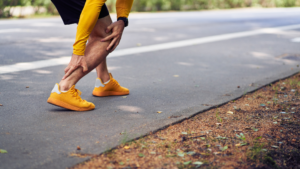
Achilles tendonitis is the overuse of the Achilles, which is the tissue connecting your calf muscle to your heel. If you’re experiencing this condition, a podiatrist in Wyandanch that accepts Medicaid will be there to help. Our very own CEC Health Center will confirm the diagnosis of Achilles tendonitis and determine the best form of treatment moving forward. We’d also like to share more information about this condition so you’ll be able to recognize right away when your Achilles has become affected by this issue.
What Is Achilles Tendonitis?
Achilles tendonitis is when the tendon in the back of your leg becomes inflamed and irritated from overworking it. It is the largest tendon in the body and is used for everyday activities such as walking, running, going up the stairs, going on your tiptoes.
Recognizing the Signs
Engaging in daily activities that involve walking and running and jumping, experiencing sporadic pain in the lower leg area can be expected. Being cognizant of how your body is feeling daily can help determine when a severe issue occurs. While pain in the back of your leg is the leading symptom of Achilles tendonitis, there are many others. The below symptoms also will infer that you may be suffering from this condition:
- Thickening of the tendon
- Swelling
- Bone spur
Be sure to visit a podiatrist in Wyandanch that accepts Medicaid if you are experiencing these symptoms.
Common Causes Of Achilles Tendonitis
Achilles tendonitis can be the result of partaking in various activities. At CEC Health Center, we have also seen patients develop this condition as a result of participating in the below activities:
- Running
- Jumping
- Putting weight on your feet
When To Visit CEC Health Center
After experiencing pain in your lower leg due to this condition, it’s easy to believe you can handle this on your own. However, there are times when resting and ice is not enough to correct the issue. When you begin to experience the below, we recommend that you contact us for treatment:
- Inability to walk
- Leg appears swollen
- High levels of discomfort
Treating Achilles Tendonitis
After being diagnosed with Achilles tendonitis, the first type of treatment CEC Health Center will recommend is physical therapy. This form of treatment is non-invasive and uses a mixture of physical-based activities to promote treatment. Below are some of the things that you can do to treat yourself before coming in.
- Medication
- Rest
- Ice
- Compression
- Elevation
- Brace or splint
These sources can be provided to you at a podiatrist in Wyandanch that accepts Medicaid called CEC Health Center. Visit our website and make an appointment today!
In some cases, you may need to have surgery. They will take out the tissue and repair the tendon back to normal. The healing process could take a while, and you will need to rest afterward.
Preventing Achilles Tendonitis
- Make sure to gradually increase your activity level gradually- Try to slowly increase the amount and intensity to prevent injury.
- Choose the right shoes- The correct shoes will change everything and make you more comfortable. You want your feet to be supported in the right areas to decrease the chance of injury.
- Strengthen your calf muscles- Having strong calf muscles will let you put more strain on your Achilles without hurting it.
- Cross-train- Make sure to switch up how you exercise. Don’t do the same thing every time and use the same muscles. Maybe bike sometimes or lift weights instead of running miles upon miles every day.
- Stretch- Increasing your calf flexibility before and after exercise will prevent these injuries from recurring.
Contact Our Podiatrist in Wyandanch That Accepts Medicaid!
The sooner you can recognize you are suffering from Achilles tendonitis, the faster you’ll be able to seek out treatment. Be sure to request an appointment with our team at CEC Health Center, a podiatrist in Wyandanch that accepts Medicaid, so you can take the first steps in regaining the functionality of your leg today! Not only will we treat you, but we will also educate you so that you can prevent future injuries!
